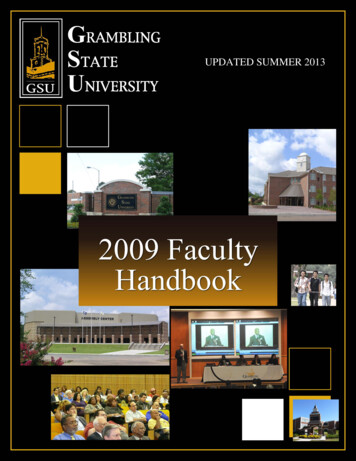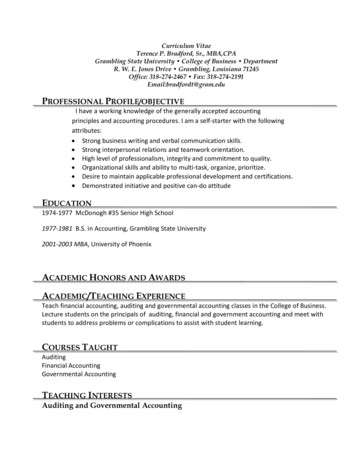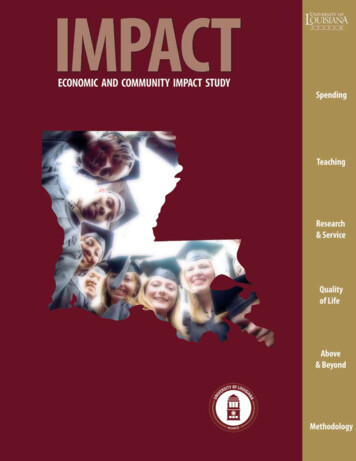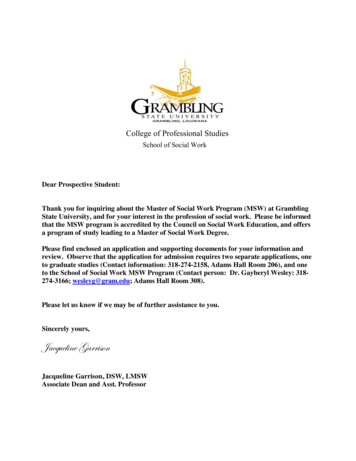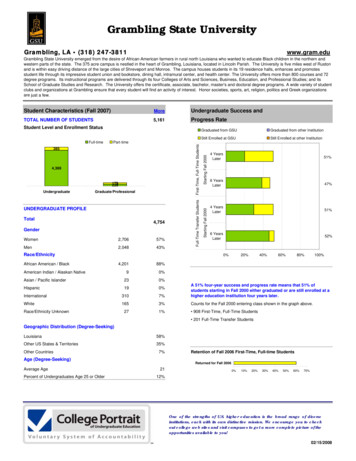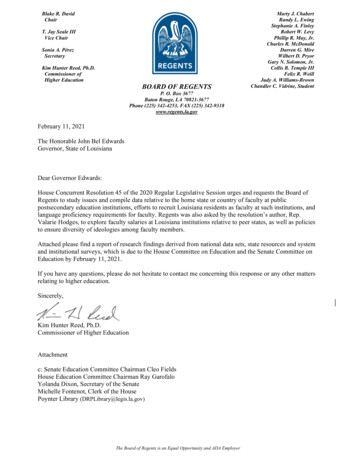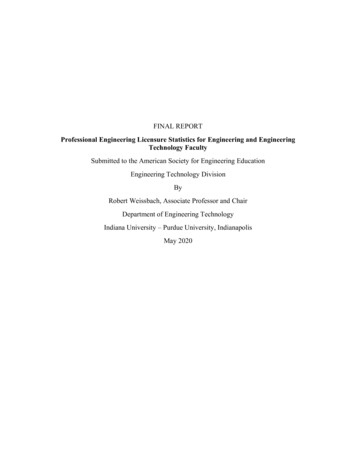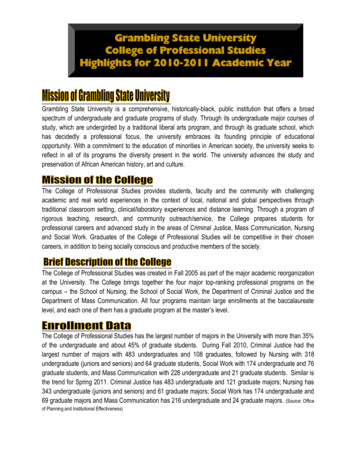
Transcription
Grambling State UniversityCollege of Professional StudiesHighlights for 2010-2011 Academic YearGrambling State University is a comprehensive, historically-black, public institution that offers a broadspectrum of undergraduate and graduate programs of study. Through its undergraduate major courses ofstudy, which are undergirded by a traditional liberal arts program, and through its graduate school, whichhas decidedly a professional focus, the university embraces its founding principle of educationalopportunity. With a commitment to the education of minorities in American society, the university seeks toreflect in all of its programs the diversity present in the world. The university advances the study andpreservation of African American history, art and culture.The College of Professional Studies provides students, faculty and the community with challengingacademic and real world experiences in the context of local, national and global perspectives throughtraditional classroom setting, clinical/laboratory experiences and distance learning. Through a program ofrigorous teaching, research, and community outreach/service, the College prepares students forprofessional careers and advanced study in the areas of Criminal Justice, Mass Communication, Nursingand Social Work. Graduates of the College of Professional Studies will be competitive in their chosencareers, in addition to being socially conscious and productive members of the society.The College of Professional Studies was created in Fall 2005 as part of the major academic reorganizationat the University. The College brings together the four major top-ranking professional programs on thecampus – the School of Nursing, the School of Social Work, the Department of Criminal Justice and theDepartment of Mass Communication. All four programs maintain large enrollments at the baccalaureatelevel, and each one of them has a graduate program at the master‟s level.The College of Professional Studies has the largest number of majors in the University with more than 35%of the undergraduate and about 45% of graduate students. During Fall 2010, Criminal Justice had thelargest number of majors with 483 undergraduates and 108 graduates, followed by Nursing with 318undergraduate (juniors and seniors) and 64 graduate students, Social Work with 174 undergraduate and 76graduate students, and Mass Communication with 228 undergraduate and 21 graduate students. Similar isthe trend for Spring 2011. Criminal Justice has 483 undergraduate and 121 graduate majors; Nursing has343 undergraduate (juniors and seniors) and 61 graduate majors; Social Work has 174 undergraduate and69 graduate majors and Mass Communication has 216 undergraduate and 24 graduate majors. (Source: Officeof Planning and Institutional Effectiveness)
The enrollment figures are reflected in the number of graduates from the College. For the 2010-2011school year, out of the total number of 906 degrees (undergraduate and graduate) awarded by theUniversity, 304 (33.55%) were from the College of Professional Studies that included 234 undergraduateand 70 graduate students. The Department of Criminal Justice graduated the largest number of studentswith 141 (104 undergraduate and 37 graduate), followed by the School of Nursing with 77 (72 BSN and 5MSN), the School of Social Work with 54 (28 BSW and 26 MSW), and the Department of MassCommunication with 32 (30 undergraduate and 2 graduate). For Fall 2010, out of the University total of427, the College graduated a total of 142 (33.25%) students (118 undergraduate and 24 graduate). ForSpring 2011, out of the University total of 489, the College graduated 166 (33.94%) students (120undergraduate and 46 graduate). Overall, the College of Professional Studies graduated 32.5% ofundergraduate and 40.2% graduate students of the University for the 2010-2011 school year. (Source: Office ofPlanning and Institutional Effectiveness)Well, the strength of the College does not depend on numbers alone; it does on the credibility and nationalrecognition of each of the programs. The School of Nursing, the School of Social Work and theDepartment of Mass Communication are nationally accredited by their respective accrediting agencies. TheSchool of Nursing is accredited by the National League of Nursing Accrediting Commission (NLNAC), theSchool of Social Work maintains its accreditation with the Commission on Accreditation of the Council ofSocial Work Education (CSWE), and the Department of Mass Communication maintains its accreditationwith the Accrediting Council for Education in Journalism and Mass Communications (ACEJMC). TheDepartment of Criminal Justice is one of the largest programs in the State of Louisiana in terms of thenumber of majors at both the undergraduate and graduate levels and in the comprehensive nature of itscurriculum. Although Criminal Justice does not have a national accrediting body, it is planning to seekcertification by the Academy of Criminal Justices Sciences (ACJS).Two programs in the College underwent reaffirmation visits during the 2010-11 school year. A threemember team, appointed by ACEJMC, visited the Department of Mass Communication, November 14-17,2010. The team recommended reaccreditation of the undergraduate program for another six years. Thisrecommendation was approved by the Accrediting Committee in March 2011 and by the AccreditingCouncil in May 2011.The School of Social Work conducted a successful visit, April 4-5, 2011, of a two-member site-visit teamappointed by CSWE. The exit report by the team, which reviewed both the BSW and MSW programs, wasextremely positive. The CSWE‟s Commission on Accreditation is expected to conduct its proceedings andsend its official notification on the reaffirmation by October 2011.The School of Nursing reaffirmation site-visit, by the National League of Nursing Accrediting Commission,is scheduled for Spring 2012. Various committees have been set up, and the faculty members are putting ina concerted effort to prepare the Self-Study Report.2
The 2010-11 school year has also been significant for the College of Professional Studies in terms ofcollaborative agreements the University entered into with community colleges in the region. Theseagreements will facilitate easy and seamless transfer of students with an associate degree from thesecolleges to a four-year degree program at Grambling State University. President Frank G. Pogue signedthe collaborative agreements with the Bossier Parish Community College (BPCC), the Louisiana DeltaCommunity College in Monroe, LA (LDCC), and Southern University at Shreveport, Louisiana (SUSLA).The GSU-BPCC agreement, signed on October 20, 2010, by President Pogue and Chancellor JimHenderson, has two phases – BPCC @ GSU and GSU @ BPCC. Under BPCC @ GSU, the BossierParish Community College will have an office on GSU campus to offer the developmental classes inEnglish and mathematics to those students who need them. After completing these requirements, thosestudents will be admitted to GSU as regular four-year degree candidates. Under GSU @ BPCC, theBossier Parish Community College will offer Grambling State University classroom space in the eveningsso that GSU will be able to offer graduate classes in several disciplines which include the Master of SocialWork (MSW), the Master of Science (MS) in Criminal Justice, and the Master of Public Administration(MPA).The GSU-LDCC Memorandum of Understanding, signed on November 15, 2010, by President Pogue andChancellor Luke Robins, is intended to enhance the educational opportunities for Delta‟s ASN-RN nursingstudents to transfer to the Bachelor of Science in Nursing (BSN) degree program at Grambling StateUniversity.The GSU-SUSLA agreement, signed on November 18, 2010, by President Pogue and Chancellor RayBelton, facilitates seamless transfer of students with an Associate of Applied Science degree in CriminalJustice to Grambling‟s Bachelor of Science degree program.The faculty in these programs have worked very hard, in collaboration with their counterparts in thecommunity colleges, to bring these agreements to fruition.These three agreements are intended not only to help increase enrollment of potential students toGrambling State University and they are also in consonance with the GRAD Act in terms of promotingcollaboration with community colleges.Two faculty members in the College of Professional Studies received doctoral degrees in their disciplines.Dr. Mildred Delozia received her Ph.D. degree in Social Work from Jackson State University in May, 2011.Her dissertation title: Childhood Neglect and Adult Attachment as Predictors of Violence amongIncarcerated Young Adults.Dr. Suyeon Park received her Ph.D. degree in Criminal Justice from Michigan State University in May 2011.Her dissertation title: Domestic Violence and Help-Seeking Behavior among Vietnamese Wives in Korea.3
If everything goes well, nine other faculty members in the College are expected to earn doctoral degreesduring the 2011-12 school year. They include:Clarence Williams of Social Work is an ABD from Barry University, Florida.Sandra Lee of Mass Communication is an ABD from the Union Institute and University at Cincinnati, Ohio.Seven faculty members from the School of Nursing are pursuing their doctoral degrees. Most of them haveattained their Candidacy/ABD status and are expected to graduate by May 2012. They are:Rhonda Hensley and LaTonya Williams are working on their Doctor of Nursing Practice (DNP) degreesfrom the University of Alabama at Birmingham.Tara Haskins is working on her Doctor of Nursing Practice (DNP) degree from the University of TennesseeHealth Sciences Center.Jamil Norman, Katina Jones and Chin-Nu Lin of Nursing are working on their Ph.D. degree in Nursing fromthe University of Texas at Tyler.Sharon Murff is working on her Ph. D. degree in Public Health from Webster University.A brief listing of major accomplishments for the 2010-11 academic year for each program is given below.The listing consists of selected highlights. More details are included in each program‟s annual report.PNP program approvedOne significant development in the recent months has been the approval of the Pediatric Nurse Practitionerprogram of the Master of Nursing degree by the National League of Nursing (NLN) and the Louisiana StateBoard of Nursing (LSBN). It is significant to note that the graduates of both the Family Nurse Practitionerand the Pediatric Nurse Practitioner programs of MSN degree maintain 100% pass rate in their certificationexams.Tequita Bryant memorial walkThe Student Nurses‟ Association, in collaboration with faculty, held its second annual Tequita BryantMemorial Walk on Saturday, April 2, 2011, to raise scholarship funds in her name. The scholarship walk isin memory of Ms. Bryant, a BSN graduate of 2007, who died immediately after passing her nursing boardexams. More than 100 students, faculty, staff and community members participated in the event.Successful site-visitThe School of Social Work conducted its site visit, April 4-5, 2011, for reaffirmation of accreditation of itsBSW and MSW programs by the Council of Social Work Education (CSWE). The two-member site-visitteam consisted of Dr. Jay Memmott (team chair) of Washburn University and Dr. George Jacinto ofArkansas State University. The team‟s exit report was very positive. In preparation for the visit, the Social4
Work faculty prepared a comprehensive self-study report responding in detail to each of the AccreditationStandards and Educational Policies. During their two-day stay, the team members had intensivediscussions with University administrators, faculty members and students, and visited the facilities. TheUniversity is expected to receive the final report on the visit from the CSWE‟s Commission on Accreditationby October, 2011.Curriculum revisionsThe faculty undertook major revisions to curricula which build on the liberal arts perspective and aims toprepare students for beginning generalist practice at the BSW level and direct clinical practice at the MSWlevel. The revised curricula are consonance with the best practices in dealing with vulnerable populations,particularly African Americans. The faculty also revised the admission processes to both BSW and MSWprograms.Grants fundedThe faculty also had three proposals funded during the school year. They include:*Delozia, M. and Hester, C.: Scholarships for Disadvantaged Students, funded by the US Department ofHealth and Human Services, for 62,652.*Williams, C.: Substance Abuse Workforce Development Initiative, HBCU-mini-grant, in collaboration withthe Morehouse School of Medicine, for 10,000.*Williams, S. E. and Garrison, J.: Title IV-E Child Welfare Grant for 116,000.00.ReaccreditationThe Department of Mass Communication gained reaccreditation of its undergraduate program (B.A. inMass Communication) for another six years from the Accrediting Council for Education in Journalism andMass Communications (ACEJMC). The three-member site-visit team‟s recommendation for reaccreditationwas unanimously approved by the Accrediting Committee in March and the Accrediting Council in May,2011. The Accrediting Council makes final decisions on all accreditation matters.During the visit, the team conducted an intensive review of all aspects of the undergraduate and graduateprograms based on the nine Standards developed by the Council. The team consisted of Mr. Phillip Dixon,chair, Department of Journalism, John H. Johnson School of Communications, Howard University (teamchair); Dr. Phillip Jeter, chair, Department of Mass Communications, Winston-Salem University; and Ms.Merrill Rose, independent consultant and Principal, Merrill Rose, LLC.Upgrade of labs and media unitsThe department completed the upgrade of computers in its labs to implement a department-wide fibernetwork that would allow the media units to communicate with one another. The network was created togive the faculty the ability to work with students in the labs from their offices. The continued effort toimprove the classroom technology enabled the faculty to be more creative in their teaching.The media units continued to serve as news and information channels for the University and the Gramblingcommunities. The Television Center was upgraded to provide quality programming, including the ability to5
cover many live events. The renewed contract with Network Television Foundation (NifTY-TV) continues toprovide internet streaming capability. Students obtained professional skills in production, editing andcamera operation in the workshops organized by the Center. The professional skills acquired by studentshave enabled them to work with the ESPN crew whenever the company covered live sports games in theregion.The 50,000-watt KGRM-FM radio station, in its effort at “Giving You Music and More,” offers a variety ofprograms to the community at large. Noted for its community service in the region, the station sponsored itsannual “Season of Giving” campaign during the Christmas time to provide toys and other gifts to the needy,and worked with the community in voter registration drives, heart walks and with the United Way. Withstreaming on the Web, Good Morning, Grambling, a morning talk show hosted by students, is one of themost popular programs aired by the radio station. The station also broadcast over 2,500 public serviceannouncements (PSAs) during the year.The Gramblinite, the student-run weekly newspaper, published 29 issues (Fall 2010: 14; Spring 2011: 13and Summer: two), including several special issues on the Founder‟s Week, the Bayou Classic, the PortCity Classic, the Homecoming, etc. The newspaper also conducted several „boot camps‟ on writing, layoutand design, including Adobe InDesign, for current and prospective staff members. The editors and writersalso won a total of 27 awards from regional and national competitions for student newspapers.Top-ranking studentDale Smith, a Criminal Justice major, with a perfect GPA of 4.0, was the topranking student of the university for the class of May 2011. This was a historicmoment for the department. Besides being honored at the Commencementceremony, the department‟s faculty and students felicitated him at a partyattended by his family members and relatives from California. Dale graduatedfrom Vista High School in Vista, California. With a keen desire to attend ahistorically Black University, he chose Grambling State University. Dale hasprofound sensitivity to the challenges faced by today‟s youth. While atGrambling, he was determined to learn more about the criminal justicesystem, especially about juvenile delinquency, criminal behavior, policing andcorrections. He also participated in a summer research program at the University of Illinois at Chicagowhere he focused on identifying factors that affect child‟s participation in juvenile delinquency programs.Dale‟s inspiration is his mom, Ms. Anita Studdard.Distinguished alumnusThe Department takes pride in its graduates who occupy important positions at federal, state and locallevels. Mr. Henry Whitehorn, former Chief of Police of Shreveport, as well as of the Louisiana State Police,is now occupying prestigious position as the Federal Marshal for Western District of Louisiana, appointedby President of the United States, Barack Obama, and ratified by the United States Senate. Mr. HenryWhitehorn was the Fall 2010 Commencement speaker at Grambling State University.6
Innovative mentoring programThe Criminal Justice faculty have initiated an innovative mentoring program for the incarcerated. Theystarted the Grambling Swanson Mentoring Program in Fall 2010, with the purpose of providing mentorsfrom Grambling State University for youth incarcerated at the Swanson Youth Correctional Center inMonroe, LA. Coordinated by Dr. Joyce Montgomery-Scott, the advisory board members are Ms. MaeConley, Dr. Lurie Thomason, Dr. Charles Minifield, Dr. Daniel Dotter, Dr. Marianne Fisher-Giorlando, Dr.Mahendra Singh and Mrs. Inetha Wimberly. The purpose of the mentoring program is to help our youngAfrican American men prepare to re-integrate into the community upon release. This program wasconceptualized by Dr. Montgomery-Scott and Ms. Carolyn Atkins, Director of Swanson.Ex-prisoner-turned-author talks to studentsEx-prisoner-turned-author Wilbert Rideau visited Grambling State University on February 23-24, 2011, totalk to students to share his experiences. Incarcerated at the Louisiana State Penitentiary at Angola for 44years, released in 2005, Rideau gained fame as the editor of the award-winning prison news magazine TheAngolite. He was the first African-American editor of The Angolite and went on to win the prestigiousGeorge Polk award in 1979, one of the coveted awards in journalism, for a series of articles he published inThe Angolite about sex and power in prison. The Angolite earned such acclaim that Rideau became knownnationwide and was frequently interviewed on TV news programs and served as a correspondent for NPR'sFresh Air.Publications:Daniel Dotter (2011). Cultural Criminology and the Carnival of Deviance: An Interactionist Appreciation. In HelgePeters and Michael Dellwing (eds.), Langweiliges Verbrechen (Boring Crime).Sozialwissenschaften, Pp. 103-114.Wiesbaden:VS Verlag furDr. Marianne Fisher-Giorlando (2011). Louisiana History of Crime, Policing and Punishment. In Social History ofCrime and Punishment in America, an Encyclopedia. Wilbur R. Miller (Editor).Park, Suyeon, Merry Morash, and Tia Stevens (2010) Gender Differences in Predictors of AssaultiveBehavior in Late Adolescence. Youth Violence and Juvenile Justice. 8 (4):314-331.Stevens, Tia, Merry Morash, and Suyeon Park (2010). Late-adolescent Delinquency: Risks and Resiliencefor Girls Differing in Risk at the Start of Adolescence. Youth and Society.Morash, Merry, Suyeon Park, and Jung-Mi Kim (2010) The Importance of Context in the Production ofOlder Girls‟ Violence: Implications for the Focus of Interventions. In Meda Chesney-Lind and Nikki Jones(eds.), Fighting for Girls: New Perspectives on Gender and Violence. State University of New York Press,Pp.219-240.Amelie Hollier & Rhonda Hensley (2010). Clinical Guidelines in Primary Care: A Reference and Review Book.Advanced Practice Associates of Louisiana, Lafayette, LA.7
Osowski, T. & Hester, C. (2010). The trauma of hurricane Katrina and its impact on student academicattainment. Mississippi Child Welfare Institute Conference Proceedings, Pp. 69-79.Williams, S. E., Nichols, Q., Kirk, A., and Wilson, T. (2010). A recent study of factors associated with childwelfare retention. Journal of Child and Youth Review.Kim, K. S., & Song, G. (2011). Who pays for news? An exploratory study on willingness to pay for digital newscontent. Korean Journal of Journalism and Communication Studies, 55(4), 134-161.The Gramblinite editors/staffers win awards/honorsThe Gramblinite won 27 awards at various regional and national competitions for campus newspapersduring the school year. These included the contests sponsored by the Southeast Journalism Conference(SEJC), the Black College Communication Association (BCCA), the Society of Professional Journalists(SPJ), and the Louisiana Press Association (LPA). Imani Jackson served as editor-in-chief during the falland spring semesters. Of the 27 awards, Jackson won four individual awards and The Gramblinite won six.Other individual first place awards include: Nasha Smith, Best Sports Feature (BCCA); Ciley Carrington,Best Feature Photography (SPJ); Qiyas Smith, Best News Story (LPA); Candice Dixson & Imani Jackson,Best News Story (LPA); LaDasha Flournoy, Staff Generated Advertising, black & white and color (LPA).A first 2nd year MSW student, Robyn Foster, was selected Student Social Worker of the Year (2011) by theLouisiana chapter of the National Association of Social Workers.Four Social Work student research papers by Elvis Tillett, Shaketa Haynes, Nola Eugene, and NatoyaTeat, were presented at the GSU undergraduate research symposium, and two were selected in the topfour, one as an alternate, and one was presented at the University of Louisiana System undergraduateresearch symposium at Northwestern State University.Four Social Work graduate students, Gayberyl Wesley, Fiona Francis, Angelicia Watson, and ChristianSpecks, were selected to attend the Morehouse College, Center of Excellence Leadership Academy. Theacademy is designed to develop a diverse cohort of leaders in the substance abuse and addiction fields bybuilding student certification skills while developing and enhancing their leadership skills to become thenext cadre of behavioral health leaders.Two Criminal Justice students, Dale Smith and Jade Trader, have received positions with Teach forAmerica, a prestigious non-profit organization. They started their assignment in June, 2011.Kerrill James, a nursing student, has been elected president of the GSU Chapter of the Society ofDistinguished Black Women, Inc. for 2010-11. She is also listed in the Who‟s Who Among Students inAmerican Universities and Colleges.8
Chancellor Luke Robins, is intended to enhance the educational opportunities for Delta‟s ASN-RN nursing students to transfer to the Bachelor of Science in Nursing (BSN) degree program at Grambling State University. The GSU-SUSLA agreement, signed on November 18, 2010, by President Pogue and Chancellor Ray
